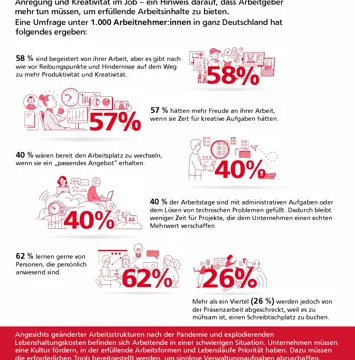Only four percent of employees limit their work output to the "bare minimum", suggesting that the biggest problem for employers is not "quiet quitting", but the lack of meaningful and fulfilling work.
57 per cent of respondents would enjoy their work more if they had more time for creative tasks.
The majority of German employees would like to see more inspiration and creativity in their jobs, sending an important signal to employers that they should ensure a varied working day. This is the result of a recent study conducted by Opinium on behalf of Ricoh Europe, which surveyed 1,000 employees and 250 decision-makers in Germany.
The new study results from Ricoh Europe contradict the much-discussed phenomenon of quiet quitting, which is mainly debated in the social media: 83 percent of employees describe themselves as committed to their current job and 58 percent state that they are enthusiastic about their work. Although workers:inside seem to be satisfied to a certain extent, there are still points of friction and resistance that prevent them from working more productively and creatively.
Rising costs of living combined with job dissatisfaction can lead workers to look for new opportunities. 40 per cent would be willing to change jobs if they received a suitable offer. Despite this, a large proportion of companies do not take their employees' concerns about wellbeing and pay progression seriously: 56 per cent of managers believe that workers should be happy to have a job in the first place.
The real challenge for employers is to give employees creative and interesting tasks that contribute to business success, rather than burdening workers with repetitive, tedious and administrative work assignments. Overall, workers spend 40 per cent of their working day on administrative tasks and solving technical problems. This leaves less time for projects that add real value to the company. If no countermeasures are taken, this can affect the motivation of employees. More than half (57%) of employees confirm that they would enjoy their work more if they had more time for creative tasks. The use of technology, such as automation, can take some of the pressure off employees and create a positive work experience.
In addition, hybrid work concepts can help employees feel comfortable and motivated in their workplace. Here, each company has to find the right balance between presence in the office and remote work. Trust and freedom show employees that the employer is really interested in their well-being. Almost two-thirds (62%) of respondents say they enjoy learning from others who are also present in the office. Forty-three per cent associate their presence in the office with leisure activities, such as meeting friends and having drinks after work. However, technical inadequacies can reduce the willingness to return to work and affect the value of the office as a collaborative and social space. More than a quarter (26%) of respondents are deterred from returning to the office because a workspace booking is too complicated.
Nicola Downing, CEO of Ricoh Europe, says: "The trending term 'internal resignation' has sparked a debate about work-life balance and drawing boundaries. Our research shows that employees don't want to 'take an inner leave' but want to work on projects that actually add value to the business. With post-pandemic changes in work structures and skyrocketing costs of living, workers are in a difficult situation, so companies need to foster a culture that prioritises interesting work tasks and employees' careers. This requires providing the tools needed to eliminate pointless administrative tasks, replace inadequate systems and focus on activities that raise the bar. Companies that sit idle run the risk of losing their employees."
www.ricoh.com
